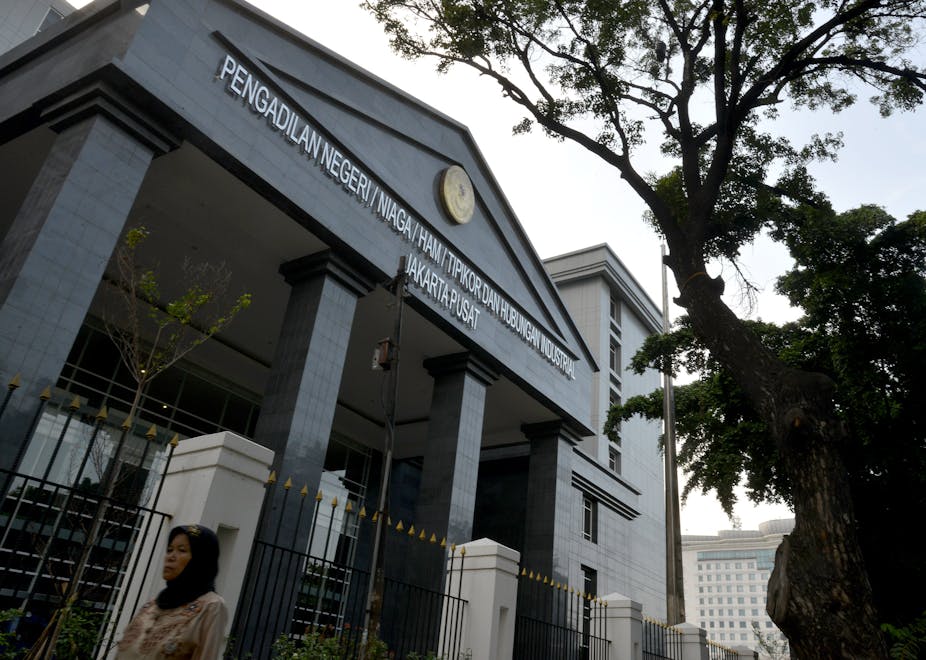Lack of funds have always been the scapegoat for the failure of anti-corruption policies. Recent studies of the Indonesian Anti-Corruption Court, for instance, sing the same old song.
Indonesian legal reformers or rule-of-law practitioners should not simply ask for bigger budgets. These naive proposals do not take into account the scarcity of government resources. They also could mean reformers overlook more suitable alternatives that take into account Indonesia’s capacities and challenges.
Often times, the public and policymakers may justify the benefits of particular policies, but fail to consider the costs of implementation.
Estimating and planning the allocation of “financial, human, and material resources” are essential to establish the enabling environment for effective and equitable legal institutions.
Indonesian anti-corruption efforts have created an unsustainable framework that makes it unfeasible to achieve all their intended impacts.
These projects should be reviewed with the “good enough governance approach” - as opposed to the “good governance” agenda. That agenda is unrealistically long and grows more convoluted over time.
Reformative anti-corruption policies
Following the financial crisis of the late 1990s and the fall of the authoritarian Soeharto regime in 1998, the Indonesian government enacted a number of anti-corruption policies.
These policies created several institutions to investigate, prosecute and adjudicate corruption crimes. They include the Corruption Eradication Commission (Komisi Pemberantasan Korupsi or KPK), the Financial Transaction Reports and Analysis Centre, and the Anti-Corruption Court.
There have also been policies promoting transparency and accountability, along with new institutions such as the Information Commission, National Public Procurement Agency, and Ombudsman.
International donors have supported the creation of all of Indonesia’s current anti-corruption institutions. Rule-of-law practitioners call this institutional approach a “measurable ends” approach.
Solid and well-functioning institutions are an essential element of the rule of law and anti-corruption projects.
However, focusing only on an institutional approach might lead to failure in achieving the actual goals of the rule-of-law and anti-corruption agenda. This could happen if rule-of-law practitioners do not consider the challenges and compatibility of newly created institutions.
Several of these Indonesian institutions have already run into budgetary problems. The Ombudsman and KPK, for example, do not have adequate resources to perform their duties. As a result, both face difficulties in investigating every reported complaint.
This is just a glimpse of the current resource problem in creating institutions that promote good governance and prevent corruption in Indonesia.
The government’s heavy reliance on donors to fund its legal reform agenda is also a problem.
When donors eventually shift their resources to other sectors and countries, will Indonesian taxpayers be willing or able to take up the cost?
Read more: Soeharto: the giant of modern Indonesia who left a legacy of violence and corruption
The case of the Indonesian Anti-Corruption Court
A 2009 Anti-Corruption Court Law mandated the establishment of anti-corruption courts in all provincial and municipal/regency capital cities - all 514 of them.
The Supreme Court, however, have so far established only 34 provincial-level courts. The slow progress is due to a lack of budget and ad hoc judges.
Scholars and activists offered solutions from two extreme ends. Scholars from one end of the spectrum urged the government to fulfil its mandate by establishing anti-corruption courts in every city. Those at the other end of the spectrum proposed the abolition of the anti-corruption court system.
One advocacy group, the Research and Advocacy Institute of Court Independence (LeIP), proposes a more comprehensive solution that takes into account the cost implications.
Instead of creating anti-corruption courts in every city, they recommend anti-corruption judges travel to the court where the case will be adjudicated.
This approach has been practised in both the common and civil law systems. It is arguably more cost-effective.
One other recommendation calls for the “single and indivisible” principle of prosecution by the state to be applied. This can mean a prosecutor could prosecute any case in any Indonesian jurisdiction.
So, if a municipal or regency-level prosecutor faces budget difficulties, they can transfer the case. The defendant and evidence for prosecution can then be brought before provincial anti-corruption courts.
Reforming the judicial system is a long journey. Reform efforts should be evaluated comprehensively and regularly, and other progressive proposals considered, as a part of “long-term judicial reform”.
Read more: Why Indonesia's omnibus bill will not create jobs and only strengthen the oligarchy
Good enough governance
Enforcing anti-corruption policies is costly, and law enforcement agencies and newly created institutions lack resources.
In other parts of the world, such as Southeastern Europe, many anti-corruption policies are also unable to work effectively due to lack of resources.
Reformers could look to develop more achievable development agendas by reviewing resources and limiting targets. This “good enough governance” idea seeks marginal improvement of development intervention by considering the underlying conditions and the dynamics of reform.
The development agenda of rule-of-law and anti-corruption projects could not be achieved in a traditional manner, such as enacting law that gives government a mandate to create new, reformed institutions.
Reformers should employ more analytical frameworks to review these projects.
The use of benefit-cost analyses, for instance, could provide valuable insight in assessing their efficiency.
These analyses could be supplemented by political economy analyses. These will help to ensure trade-offs, incentives and resources are considered when promoting rule of law and anti-corruption projects.
These approaches are important because many developing countries, like Indonesia, have limited resources. They could save the government from adopting legal reform projects that are costly and likely to fail.


